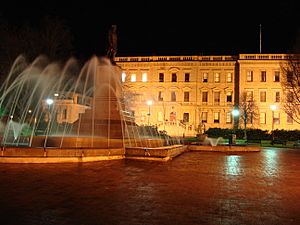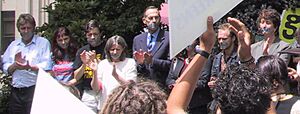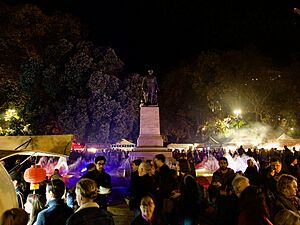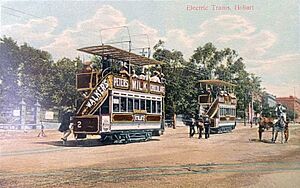Franklin Square (Hobart) facts for kids
Quick facts for kids Franklin Square |
|
|---|---|

Franklin Square monument fountain with Franklin Square Offices at night
|
|
| Type | Public space |
| Location | 70 Macquarie Street, Hobart, Tasmania, Australia |
| Area | 1.6 acres (0.63 hectares) |
| Created | 1863-1866 |
| Operated by | Hobart City Council |
| Open | All year |
| Public transit access | Hobart Bus Mall |
| Place ID: | 2,333 |
| Status: | Permanently Registered |
Franklin Square is a lovely park in the heart of Hobart, Tasmania, Australia. It's about the size of a small sports field, covered with beautiful oak trees. The park is named after Sir John Franklin, who was a famous explorer and an early leader of Tasmania.
In the middle of the park, you'll find a statue of Sir John Franklin. It even has a special message written by a famous poet, Alfred, Lord Tennyson. Because it's right in the city center, Franklin Square is a popular spot. People use it for fun markets, big community gatherings, and even peaceful protests.
Contents
History of Franklin Square
Franklin Square and the nearby Treasury buildings were built on the land where the Old Government House once stood. That old building was taken down in 1858.
How the Park Began
The area was first called George's Square, named after King George IV. An early leader, Governor Lachlan Macquarie, imagined it as a place for important buildings like a church and a courthouse. He also thought it could be a market and a parade ground for soldiers. But later, people decided that the growing town needed a special public space for everyone to meet.
In 1860, the government agreed to set aside money for a statue and a fountain. These would be the main features of the new park, honoring Sir John Franklin.
Royal Trees Planted
On May 20, 1863, two oak trees were planted in Franklin Square. This was done by Thomas Gore Browne, who was the second Governor of Tasmania, and his wife, Harriet Louisa Browne. They planted the trees to celebrate the marriage of Edward VII (who would later become king) to Alexandra of Denmark. Many people gathered for a parade and watched the planting. The Governor hoped the trees would grow strong, just like the loyalty of the people of Tasmania. Years later, in 1903, a special plaque was added to remember this event.
A Bomb Shelter During Wartime
During the Second World War, people in Hobart worried about attacks. This was especially true after a German ship placed mines nearby and a Japanese plane flew over the city. Because Franklin Square was in the middle of Hobart, it was turned into a bomb shelter. It could protect up to 900 people during air raids.
Modern Upgrades in 2016
In 2015, Franklin Square closed for some big improvements. Workers fixed the fountain's water and electrical systems. They also updated the restrooms, added new garden beds, and made pathways easier to use. Even the giant chess board was moved! Special wood from Lake Pieman was used to make new park benches. Franklin Square officially reopened on May 27, 2016, looking better than ever.
Protests and Public Gatherings

Franklin Square has often been a place where people gather to share their opinions. It's a common spot for peaceful protests about important issues. People have protested for things like worker's rights, showing support for Tibet, and discussing rules about genetically modified crops.
Some important events include:
- In October 1975, many people protested at the square when Malcolm Fraser, a political leader, visited.
- Between 1981 and 1983, large protests happened here about the Franklin Dam controversy, which was about protecting a wild river.
- On December 15, 2004, Bob Brown and The Greens protested against a company called Gunns.
- Thousands of people gathered on November 17, 2007, to protest against a big paper mill project in the Tamar Valley.
Park Layout and Nature
Franklin Square is shaped like a slightly slanted rectangle. It covers about one city block, surrounded by Macquarie, Elizabeth, and Davey Streets. The park gently slopes up from Davey Street to Macquarie Street. Around the park, you'll find the Franklin Square Offices, sidewalks, and bus stops.
Trees and Plants
The park is known for its beautiful, old trees. Many of them are English elms and Tilia trees, which are over 150 years old. You can also find a Tree of Heaven and some evergreen trees from New Zealand.
Hobart Bus Hub
Franklin Square is a major hub for buses in Hobart. Metro Tasmania operates many bus services that start or end here. You can catch buses from Macquarie Street (Stops D1 and D2) and Elizabeth Street (Stop D3).
| Bus Route | Destination | Departing | Stop |
|---|---|---|---|
| X01, X08 | Huntingfield | Macquarie Street | D1 |
| X07, 407, 408, 409, 427, 428, 500 | Blackmans Bay | Macquarie Street | D1 |
| 410 | Kingston | Macquarie Street | D1 |
| 411 | Howden | Macquarie Street | D1 |
| 412 | Margate | Macquarie Street | D1 |
| X13, 413 | Snug | Macquarie Street | D1 |
| 415 | Woodbridge | Macquarie Street | D1 |
| 416 | Middleton | Macquarie Street | D1 |
| 417 | Gordon | Macquarie Street | D1 |
| 426 | Taroona | Macquarie Street | D1 |
| 429 | Summerleas Road | Macquarie Street | D1 |
| X710, 710 | Huonville | Macquarie Street | D1 |
| 712 | Ranelagh | Macquarie Street | D1 |
| 714 | Cygnet | Macquarie Street | D1 |
| 714 | Geeveston | Macquarie Street | D1 |
| 718, 719 | Dover | Macquarie Street | D1 |
| 446 | Marlyn Road | Macquarie Street | D2 |
| 447 | Strickland Avenue | Macquarie Street | D2 |
| 448, 449 | Fern Tree | Macquarie Street | D2 |
| 401, 402 | Lower Sandy Bay | Elizabeth Street | D3 |
| X58, 457, 458 | Mount Nelson | Elizabeth Street | D3 |
| 501, 601 | University | Elizabeth Street | D3 |
Park Features
Franklin Square has several interesting features that visitors can enjoy.
King Edward VII Statue
You can find a bronze statue of King Edward VII on a stone base along Macquarie Street. It's now quite close to the road because of changes made for bus stops.
John Franklin Monument
The main feature of Franklin Square is a large monument dedicated to John Franklin. It includes a big bronze statue on a stone base, surrounded by a two-level fountain. This statue was one of the park's first attractions, put in place in 1860. In 1947, a special celebration was held to mark 100 years since Franklin was a leader in Tasmania. Floodlights were also added to the fountain that year.
Giant Chess Set
Along the Davey Street side of the park, there's a special concrete area that's a giant outdoor chess board. It's about 4 meters by 4 meters! The Sandy Bay Lions Club created it in 1960. The large chess pieces were made with money donated by a company called IXL Jam. You can play chess here every day from 8 AM to 6 PM.
Two Islands Sculpture
In 2015, the City of Hobart invested in a new artwork called Two Islands. It was created by artist Nigel Helyer and finished in 2017. This special sculpture uses wood, steel, lights, and sound. An Aboriginal canoe-maker, Tony Brown, helped with its design.
Wishing Well
There's a beautiful wishing well made of sandstone with fancy ironwork. It was opened in 1955 to celebrate 21 years of community work by the APEX Club of Hobart. Any money donated into the well goes to help the Tascare Society for Children.
Removed Features
Over the years, some things in Franklin Square have changed or been removed as the park has grown.
Old Cannon
Long ago, in the 1860s, there was a cannon facing Macquarie Street. It was there to remember that the area used to be a place for military parades. But it was removed during the Second World War when the square became a bomb shelter.
William Crowther Statue

A large bronze statue of Dr William Lodewyk Crowther was placed in the square in 1889. Crowther was a surgeon and a former leader of Tasmania. In recent years, this statue became a topic of much discussion. This was because of Crowther's actions involving the remains of William Lanne, the last full-blooded Tasmanian Aboriginal man, in 1869.
Rethinking the Statue
In 2021, the City of Hobart chose four temporary artworks to be displayed around the statue. This project, called Crowther Reinterpreted, aimed to encourage conversations about the statue's future. One artwork by Allan Mansell, an Aboriginal artist, changed the statue to represent Lanne. Another artwork by Julie Gough covered the statue with a large black box. Some of Crowther's own family members learned about his past actions through this project and asked for the statue to be removed.
Council Decision and Removal
On August 15, 2022, the Hobart City Council voted to remove Crowther's statue from public display. This was a significant decision in Australia. The exact future of the statue was debated, with ideas ranging from moving it to a museum to provide more historical context.
Legal challenges followed the council's decision. However, the Tasmanian Civil and Administrative Tribunal (TCAT) supported the removal, saying it would help with truth-telling and reconciliation. Just before the final ruling on May 15, 2024, the statue was pulled down. Its legs were cut, and messages about decolonization were sprayed on its base.
Palisade Fence
Originally, the square was surrounded by a fancy iron fence. The gates were removed in the 1930s. During the Second World War, when the square became an air raid shelter, the fence was completely removed in 1944 to make the park more accessible.
See also
- Old Government House, Hobart
 | William M. Jackson |
 | Juan E. Gilbert |
 | Neil deGrasse Tyson |



